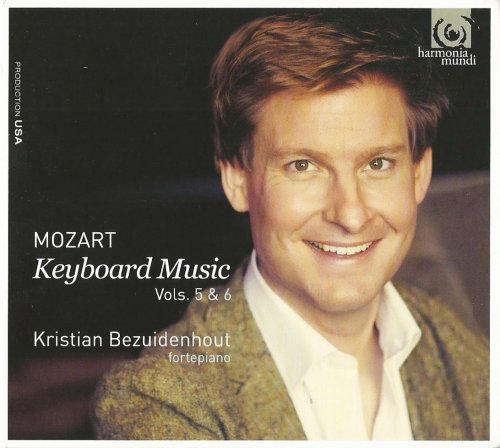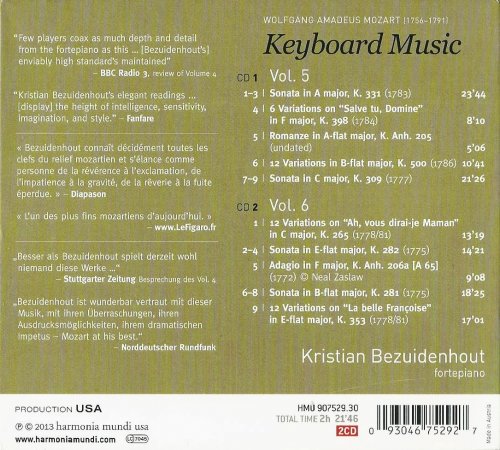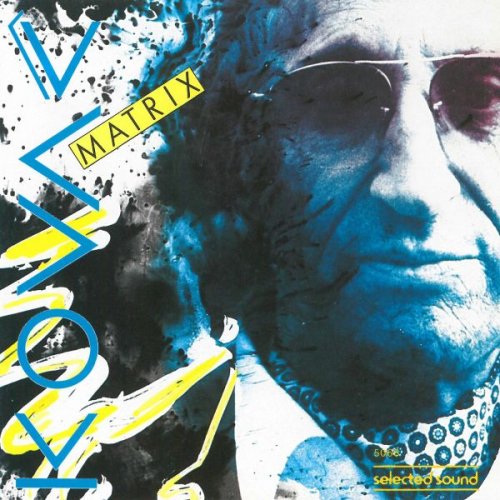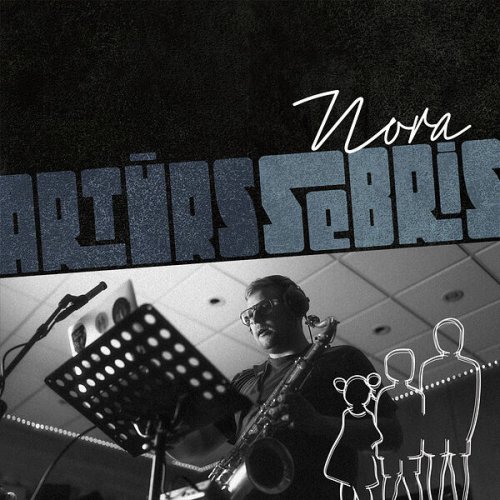Kristian Bezuidenhout - Mozart: Keyboard Music, Vol. 5 & 6 (2014)

Artist: Kristian Bezuidenhout
Title: Mozart: Keyboard Music, Vol. 5 & 6
Year Of Release: 2014
Label: Harmonia Mundi
Genre: Classical
Quality: FLAC (image+.cue,log,scans)
Total Time: 02:21:35
Total Size: 572 Mb
WebSite: Album Preview
Tracklist: Title: Mozart: Keyboard Music, Vol. 5 & 6
Year Of Release: 2014
Label: Harmonia Mundi
Genre: Classical
Quality: FLAC (image+.cue,log,scans)
Total Time: 02:21:35
Total Size: 572 Mb
WebSite: Album Preview
Vol.5:
01. Sonata in A major K.331 - I. Andante grazioso [0:14:19.10]
02. Sonata in A major K.331 - II. Menuetto - Trio [0:05:59.21]
03. Sonata in A major K.331 - III. Alla turca. Allegretto [0:03:23.65]
04. 6 Variations on "Salve tu, Domine" in F major K.398 [0:08:10.14]
05. Romanze in A flat major K. Anh. 205 [0:05:06.10]
06. 12 Variations in B flat major K.500 [0:10:40.54]
07. Sonata in C major K.309 - I. Allegro con spirito [0:08:47.17]
08. Sonata in C major K.309 - II. Andante, un poco adagio [0:06:10.18]
09. Sonata in C major K.309 - III. Rondeau: Allegretto grazioso [0:06:28.05]
Vol.6:
01. 12 Variations on "Ah, vous dirai-je Maman" in C major K.265 [0:13:25.40]
02. Sonata in E flat major K.282 - I. Adagio [0:07:10.21]
03. Sonata in E flat major K.282 - II. Menuetto 1 - Menuetto 2 [0:04:02.69]
04. Sonata in E flat major K.282 - III. Allegro [0:03:13.61]
05. Adagio in F major K. Anh. 206a [0:09:14.01]
06. Sonata in B flat major K.281 - I. Allegro [0:06:54.74]
07. Sonata in B flat major K.281 - II. Andante amoroso [0:06:16.03]
08. Sonata in B flat major K.281 - III. Rondeau: Allegro [0:05:18.12]
09. 12 Variations on "La belle Françoise" in E flat major K.353 [0:17:01.10]
Performers:
Kristian Bezuidenhout - fortepiano
The fortepiano is by no means my favorite instrument. That truly needs to be said because this Mozart recital is a stunner. Rarely can I listen to more than two hours of any one composer at a sitting and not at least slightly drift off. The program here is one of those exceptions, as in the last month I have probably played this recording over 40 times complete from beginning to end. There are two major reasons for this: Firstly, Bezuidenhout has carefully crafted this program to show the many different sides of this multifaceted composer using a variety of solo genres. It is fascinating that not one of the pieces on either volume 5 or 6 is in a minor key! And yet never does the overwhelming major sound become monotonous. Secondly, and perhaps most importantly, is Bezuidenhout’s approach to the composer. His Mozart is not a pretty, dainty, and delicate one; his is a vigorous, energetic, and spontaneous one, though filled with a keen sense of both elegance and sensitivity—it is, in a sense, a Romanticized Mozart, in which the listener can sense the 20th-century’s teachings. Is this the manner in which Mozart should be played? That’s impossible to say. But it does work—and at times brilliantly!
Bezuidenhout’s way with the music is somewhat free. He uses slight pauses between certain phrases and deviations in tempos in certain movements. He is even slightly percussive in instances such as the “Rondo alla turca.” Yet so well thought out is the musical idea that there is hardly an instance that doesn’t make one stop and listen. The pianist’s free way works especially well in the numerous sets of variations, where Mozart too is free in terms of notation (the cadenza at the end of the Variations in F Major, or the end of the Variations in B? Major providing perfect examples). One of the finest moments of the program, however—and I look at this two-volume set as one big recital—comes in the C-Major Piano Sonata. The pianist does not treat the first movement just as a solo piano piece; rather, there is an orchestral quality to his playing here as well, just as in the aforementioned A-Major Sonata. The slow movement to K 309 is equally beautifully rendered: The longing quality is made palpable by the careful shading and the wonderfully judged pauses. This is one of the highlights of the disc. The third movement brings back the sunny quality for which Mozart was so well known. Especially noteworthy here is the pianist’s attention to details of articulation—the smooth ebb and flow of the arpeggiations on one hand, the bouncy and crisp use of staccato on the other—which add to the overall joyous mood. The tempos are well judged throughout the entire recital, never overly fast as in some performances. Even more importantly, Bezuidenhout is never afraid to imprint his own personality on the music. Repeats are often ornamented judiciously, though never so much so as to disturb the musical idea. One always hears Mozart above all. That’s not to say that I agree with everything the pianist does. At times I find the playing a bit too fussy, but that happens only rarely: Take the opening of the A-Major Sonata. Its theme is simple and straightforward. In Bezuidenhout’s hands it sounds just a bit too calculated, as though he’s trying to say everything in the movement too soon, foreshadowing the effect of the variations that follow.
While there are those who would outwardly refuse to listen to this recording based purely on the instrument, I would warn against such strong leanings: The playing alone will win you over. Bezuidenhout’s approach to Mozart is uninhibited, unafraid, and unabashed—this is Mozart playing which is simply delightful. And if you think you know this music like the back of your hand, give this a try. There’s more to the music here than first meets the ear. And who can ever have enough Mozart in their collection? -- Scott Noriega
Bezuidenhout’s way with the music is somewhat free. He uses slight pauses between certain phrases and deviations in tempos in certain movements. He is even slightly percussive in instances such as the “Rondo alla turca.” Yet so well thought out is the musical idea that there is hardly an instance that doesn’t make one stop and listen. The pianist’s free way works especially well in the numerous sets of variations, where Mozart too is free in terms of notation (the cadenza at the end of the Variations in F Major, or the end of the Variations in B? Major providing perfect examples). One of the finest moments of the program, however—and I look at this two-volume set as one big recital—comes in the C-Major Piano Sonata. The pianist does not treat the first movement just as a solo piano piece; rather, there is an orchestral quality to his playing here as well, just as in the aforementioned A-Major Sonata. The slow movement to K 309 is equally beautifully rendered: The longing quality is made palpable by the careful shading and the wonderfully judged pauses. This is one of the highlights of the disc. The third movement brings back the sunny quality for which Mozart was so well known. Especially noteworthy here is the pianist’s attention to details of articulation—the smooth ebb and flow of the arpeggiations on one hand, the bouncy and crisp use of staccato on the other—which add to the overall joyous mood. The tempos are well judged throughout the entire recital, never overly fast as in some performances. Even more importantly, Bezuidenhout is never afraid to imprint his own personality on the music. Repeats are often ornamented judiciously, though never so much so as to disturb the musical idea. One always hears Mozart above all. That’s not to say that I agree with everything the pianist does. At times I find the playing a bit too fussy, but that happens only rarely: Take the opening of the A-Major Sonata. Its theme is simple and straightforward. In Bezuidenhout’s hands it sounds just a bit too calculated, as though he’s trying to say everything in the movement too soon, foreshadowing the effect of the variations that follow.
While there are those who would outwardly refuse to listen to this recording based purely on the instrument, I would warn against such strong leanings: The playing alone will win you over. Bezuidenhout’s approach to Mozart is uninhibited, unafraid, and unabashed—this is Mozart playing which is simply delightful. And if you think you know this music like the back of your hand, give this a try. There’s more to the music here than first meets the ear. And who can ever have enough Mozart in their collection? -- Scott Noriega

DOWNLOAD FROM ISRA.CLOUD
Kristian Bezuidenhout Mozart Keyboard Music Vol 5 & 6 14 1608.rar - 572.5 MB
Kristian Bezuidenhout Mozart Keyboard Music Vol 5 & 6 14 1608.rar - 572.5 MB
![Ablaye Cissoko, Kiya Tabassian, Constantinople - Estuaire (2026) [Hi-Res] Ablaye Cissoko, Kiya Tabassian, Constantinople - Estuaire (2026) [Hi-Res]](https://img.israbox.com/img/2026-02/05/bd2ycop79dvrdm4dy879uxato.jpg)







